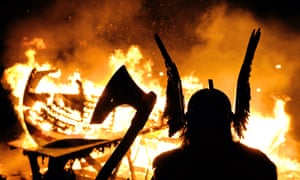via About History
The Hunno-Chinese Wars ( 202 BC – approximately 181 AD, with interruptions) – a series of military conflicts between the Hunnish and Han China and the allies of the opposing sides.
The result was the destruction of the Hunnish state, which was one of the reasons for the Great Migration.
Continue reading [and if you simply cannot be bothered just enjoy the image above which is, unfortunately, not attributed].
==============================
via Boing Boing by David Pescovitz

Crystal Cave by Andrew Malone, CC)
In Bermuda, the enchanting Crystal Caves attract tourists with their huge stalactites and stalagmites above the clear water pools. As a child, Michael K. Frith frequently visited the caves and never forgot their weird, otherworldly beauty. Those caves would eventually inspire Frith, working with puppeteer Jim Henson, to co-create Fraggle Rock, a beloved muppet TV series that premiered in 1983.
Continue reading
==============================
via Interesting Literature
‘I Have a Gentle Cock’ dates from the Middle Ages – probably the fourteenth century – as the Middle English spelling (reproduced in the original below) suggests. And yes, there is a bawdy double entendre going on in the title of this short medieval lyric: ‘cock’ is not just a cockerel, one suspects, especially as it appears, suggestively, in the ‘lady’s chamber’ at the end of the poem…
Continue reading
==============================
via the OUP blog by Joanna Innes

The Promulgation of the Constitution of 1812. Oil painting by Salvador Viniegra. Public Domain via Wikimedia Commons.
Did modern democracy start its long career in the North Atlantic? Was it invented by the Americans, the French and the British? The French Revolution certainly helped to inject modern meaning into a term previously chiefly associated with the ancient world, with ancient Greece and republican Rome. In the 1830s the French commentator Alexis de Tocqueville concluded from his trip to the United States that it was possible for a modern state to function as a democracy (in both a political and a social sense)—even though it remained to be seen if what worked in the new world could be made to work in the old. The British establishment was late in embracing democratic rhetoric, retaining reservations well into the twentieth century, but the British model of representative government gave the people some role while holding them in check—which was reassuring for nervous elites elsewhere.
Continue reading
==============================
The cult artist and author proves an evasive subject for biography, a fact that would surely have delighted him.
via the Boston Review: apolitical and literary forum by John Crowley
Born to Be Posthumous: The Eccentric Life and Mysterious Genius of Edward GoreyMark DeryIn his small books, Edward Gorey mastered the art of false nostalgia, evoking in the reader a mood at once fearsome, absurd, unsettling, and comic. In the first of Gorey’s published books, The Unstrung Harp (1953), the character of Mr. C. F. Earbrass, “the noted novelist”, begins in some trepidation his new book, to be titled (like the book that contains him) The Unstrung Harp. Begun while Gorey was still an undergraduate at Harvard, it is nevertheless the best book ever made about the awful pains and fleeting pleasures of writing a novel. The Unstrung Harp has quite a lot of prose, but in subsequent projects, Gorey whittled down his texts to the slivers of scintillating ambiguity that would become a hallmark of his style: The Listing Attic (1954), limericks; The Doubtful Guest (1957), couplets; The Object-Lesson (1958), obscure scraps of prose narration. By 1962 he had published ten of his little books. The Willowdale Handcar appeared that year, and it would be my introduction to his work. I bought it as a gift for my sister, not knowing that with it I (and she) had begun a life of loving Gorey.
Little, Brown and Company, $35 (cloth)
Continue reading
==============================
via Boing Boing by Rob Beschizza

Countries surrounding the North Sea imposed an outsize impact on world affairs. But the sea itself was once land, and might have stayed that way had world temperatures been a degree or two different.
Continue reading
==============================
via About History by Kathryn Warner

Edward II (born 1284, king of England 1307-1327) appears in the perennially popular Mel Gibson vehicle Braveheart (1995) as the camp, fey, feeble prince whose gorgeous but unfulfilled French wife Isabella cuckolds him with the manly hero Sir William Wallace, whom the film presents as the real father of Edward’s son. (In fact, Wallace was executed by Edward I on 23 August 1305; Isabella of France arrived in England on 7 February 1308 and never met her husband’s father; Isabella and Edward II’s eldest child Edward III was born on 13 November 1312.) Edward II also appears in the recent Hollywood film The Outlaw King, in which Chris Pine plays Robert Bruce, who became King Robert I of Scotland in 1306 and who defeated Edward at the battle of Bannockburn near Stirling Castle in June 1314. In this film, Edward is depicted as a raving, screaming, self-pitying psychopath sporting an anachronistic fifteenth-century pudding bowl haircut.
Continue reading and discover that this man has, like so many, been a victim of “the winner writes the history”.
==============================
via Interesting Literature
‘Little Jack Horner’ has attracted a good deal more speculation than many other famous nursery rhymes, and others have had a fair bit. But for some reason, this little children’s rhyme about a boy eating a Christmas pie and pulling out a plum has been the subject of more debate than 90% of nursery rhymes in the English language. Why has the rhyme of ‘Little Jack Horner’ attracted such wild analysis, interpretation, and speculation?
Continue reading
==============================
via the Guardian by David Crouch in Ribe

The discoveries at Ribe defy the popular image of Vikings as mainly raiders. Photograph: Carl de Souza/AFP/Getty Images
Excavations in Ribe, Denmark show that Viking culture was based on sophisticated production and trade. Is their brutal reputation unfair?
In an extraordinary moment captured on film this summer, the tuning pegs and neck of a lyre, a harplike stringed instrument, were carefully prised out of the soil of Ribe, a picturesque town on Denmark’s south-west coast. Dated to around AD720, the find was the earliest evidence not just of Viking music, but of a culture that supported instrument-makers and musicians.
Continue reading
No comments:
Post a Comment